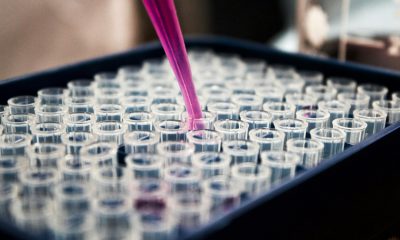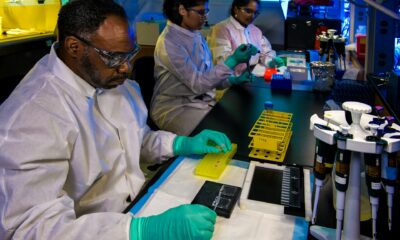Biotech
Roche profit rises 17% in 2020 but its pharma division suffers
While on the one hand, the company Roche had a very good year in 2020, on the other hand, it was affected by the corona crisis.Thus, the company’s net profit increased by 17% compared to the year before, reaching $16.73 billion (€13.96 billion). However, Roche’s pharmaceutical division was affected and sales fell by 2%.

The Swiss multinational Roche increased its net profit in 2020 to $16.73 billion (€13.96 billion), a growth of 17% compared with the previous year’s accounts. “It was mainly due to a lower goodwill impairment compared to the previous year,” the company explained.
At the same time, the company suffered the impact of the pandemic in its pharmaceutical division, where sales fell by 2%. In contrast, the Diagnostics division grew by 14%. In Roche’s case, losing 2020 is significant, as many of the drugs that enjoyed good sales were approved in 2012, which means that they are enjoying their last years of patent.
If you want to find more details about Roche and to find other important business news, download for free the Born2Invest mobile app.
The pandemic has significantly affected the figures
On the one hand, the company acknowledges that the pharmaceutical division has managed to mitigate the entry of competing drugs (5.1 billion) but not the saturation of hospitals as a result of the coronavirus, which has meant that other pathologies have been left behind.
Roche’s drugs, especially in the oncology area, have performed well enough to suggest growth in sales for the coming years. The company estimates that in 2021 there will be single-digit growth. Sales of historical drugs such as Avastin and Herceptin (sales fell by 31% and 34%) due to market pressure caused by biosimilars. On the other side of the coin, sales of Tecentriq, Hemlibra and Ocrevus, among others, grew by 32%. Lucentis, the ophthalmological drug, also fell, due to the pressure on care caused by the coronavirus. It is also true that without the pandemic, the aforementioned oncology drugs could have performed better.
This same pandemic, on the other hand, has relaunched the Diagnostics Division, which has grown mainly thanks to the tests that the company has developed, concentrated in the second half of 2020. “Sales in the Diagnostics Division increased by 14% for the year as a whole (28% in the last quarter) due to COVID-19-related diagnostic activity, more than offsetting the reduction in routine diagnostic activity due to the pandemic,” the company explained.
Beyond Roche’s historical business units, the multinational has also had activities related to the coronavirus, beyond its Diagnostics division, which has obviously developed various devices. The Swiss company is working with Regeneron to increase the global supply of an investigational antiviral antibody combination (August). In fact, this compound is used in the United States and was the treatment given to Donal Trump in the election campaign.
Roche also reached an agreement with Atea to develop a potential oral treatment for Covid-19 (October) and with Moderna to include the recently launched antibody test in its ongoing vaccine trials (December).
Looking ahead
A lost year for a pharmaceutical company can weigh heavily on its performance. Products that are still on patent are the big drivers and losing twelve months of exploitation is significant. This has happened to Roche as well as to many other companies that have presented results in recent days.
However, the Swiss multinational has shown a portfolio of products for the future that will allow it to enjoy health in the coming years. In the last quarter of 2020, four drugs were approved between the United States and Europe: Gavreto (thyroid cancer); Xofluza (influenza); Xolair (nasal polyps) and Tecentriq plus Avastin (liver cancer).
In addition, the company has 19 new compounds in Phase III clinical trials or with approval applications in progress. In fact, Roche increased investment in research and development by over 8% to 12.2 billion Swiss francs.
__
(Featured image by AbsolutVision via Pixabay)
DISCLAIMER: This article was written by a third party contributor and does not reflect the opinion of Born2Invest, its management, staff or its associates. Please review our disclaimer for more information.
This article may include forward-looking statements. These forward-looking statements generally are identified by the words “believe,” “project,” “estimate,” “become,” “plan,” “will,” and similar expressions. These forward-looking statements involve known and unknown risks as well as uncertainties, including those discussed in the following cautionary statements and elsewhere in this article and on this site. Although the Company may believe that its expectations are based on reasonable assumptions, the actual results that the Company may achieve may differ materially from any forward-looking statements, which reflect the opinions of the management of the Company only as of the date hereof. Additionally, please make sure to read these important disclosures.
First published in elEconomista.es, a third-party contributor translated and adapted the article from the original. In case of discrepancy, the original will prevail.
Although we made reasonable efforts to provide accurate translations, some parts may be incorrect. Born2Invest assumes no responsibility for errors, omissions or ambiguities in the translations provided on this website. Any person or entity relying on translated content does so at their own risk. Born2Invest is not responsible for losses caused by such reliance on the accuracy or reliability of translated information. If you wish to report an error or inaccuracy in the translation, we encourage you to contact us.

-

 Impact Investing2 weeks ago
Impact Investing2 weeks agoGlobal Gender Gap Progress Slows Amid Persistent Inequality and Emerging Risks
-

 Biotech5 days ago
Biotech5 days agoVytrus Biotech Marks Historic 2024 with Sustainability Milestones and 35% Revenue Growth
-

 Crowdfunding2 weeks ago
Crowdfunding2 weeks agoColombia Approves Terrenta’s Crowdfunding Platform for Real Estate Financing
-

 Africa7 days ago
Africa7 days agoCôte d’Ivoire Unveils Ambitious Plan to Triple Oil Output and Double Gas Production by 2030

























